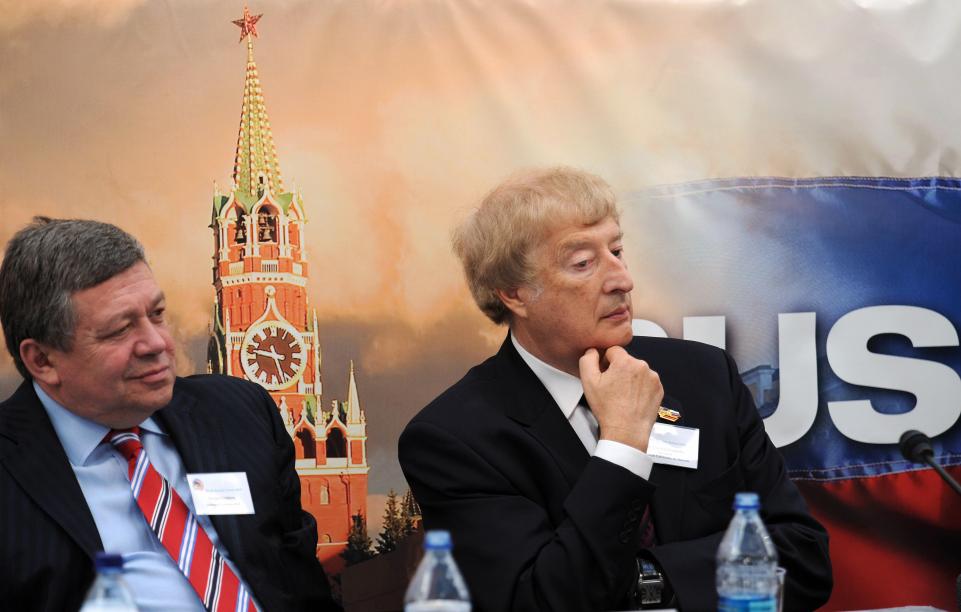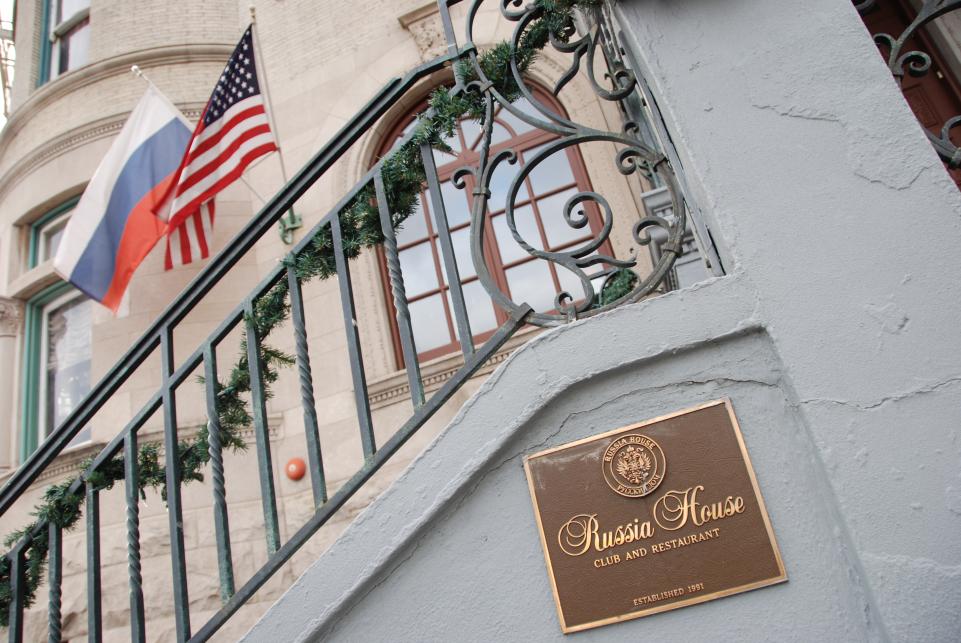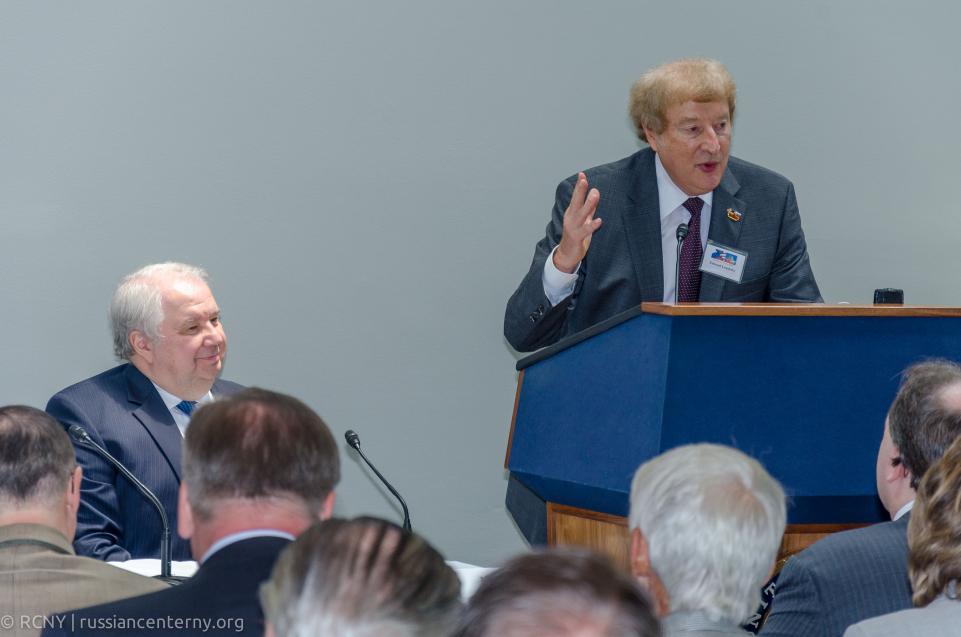
 In the shade of Arlington Cemetery outside of Washington, D.C. on Tuesday, dozens of Americans and Russians sat on folding chairs and presented wreaths at a memorial to Elbe Day. The 20-year-old plaque commemorates the day at the end of World War II that American and Soviet troops met at the Elbe River in Germany, a moment signifying that they were gaining control of the country. Simultaneously, in Moscow, people gathered to mark the anniversary, too.
In the shade of Arlington Cemetery outside of Washington, D.C. on Tuesday, dozens of Americans and Russians sat on folding chairs and presented wreaths at a memorial to Elbe Day. The 20-year-old plaque commemorates the day at the end of World War II that American and Soviet troops met at the Elbe River in Germany, a moment signifying that they were gaining control of the country. Simultaneously, in Moscow, people gathered to mark the anniversary, too.
BY MAX KUTNER
In the shade of Arlington Cemetery outside of Washington, D.C. on Tuesday, dozens of Americans and Russians sat on folding chairs and presented wreaths at a memorial to Elbe Day. The 20-year-old plaque commemorates the day at the end of World War II that American and Soviet troops met at the Elbe River in Germany, a moment signifying that they were gaining control of the country. Simultaneously, in Moscow, people gathered to mark the anniversary, too.
The commemoration is an annual event. But this year, Edward Lozansky, a Soviet-born American living in Washington, D.C., took credit for a video simulcast that enabled people in Moscow to see the group at the cemetery on a video screen. Lozansky considered the event this year’s version of his World Russia Forum, an annual conference he started almost four decades ago with the stated goal of promoting United States-Russia relations.
Tuesday’s event was much different from the World Russia Forums of years past. While the conference used to attract White House administration officials and members of Congress, and fill a room at the Hart Senate Office Building, Lozansky has had trouble securing speakers in recent years, given the fallout in relations between the two countries.
Lozansky, a former nuclear physicist who emigrated from the Soviet Union in 1976, is known in Russia policy circles as a mysterious, conservative figure. With analysts warning of a new Cold War, and as the Department of Justice and Congress investigate Russia’s interference in the 2016 presidential election, Lozansky’s efforts to promote Russia in Washington have drawn scrutiny from analysts and even allegations that he is spreading propaganda for the Kremlin.
Lozansky denied the allegations and said they were not new to him. "I am a U.S. citizen and I thank and am grateful for the United States because the United States gave me refuge from the Soviets,” he said. "If Russia is a friend, it’s good for America…. If you want to call me a propagandist, yes, I accept that, but for the United States, not for Russia.”

Edward Lozansky, right, president of American University in Moscow, participates in a panel discussion on United States-Russia economic cooperation during the World Russian Forum on May 19, 2008 in Washington, D.C. As analysts question Russian meddling in the U.S., Lozansky and his efforts have received scrutiny.
TIM SLOAN/AFP/GETTY
The first World Russia Forum took place in 1981. Lozansky later started other entities associated with the conference, including the American University in Moscow in 1990 and, in 1991, Russia House, a for-profit corporation with the stated aim of promoting "U.S.-Russia business, science, educational and cultural cooperation” by hosting events. Its website says it has "offices” in Washington, New York and Moscow.
"It started at a time of high expectations,” Lozansky said in a recent phone interview about his efforts. "Russia was ready to become part of the West. And the West turned it down.”
In better years, the World Russia Forum attracted diverse speakers such as then-Congressman Dennis Kucinich; John Bolton, then a Department of State official and now the U.S. national security adviser; Bill Browder, a financier who has since become an outspoken critic of Russian President Vladimir Putin; Margarita Simonyan, editor-in-chief of the state-funded Russian outlet RT; and former Russian Ambassador Sergey Kislyak. Representative Dana Rohrabacher, a Republican from California who the media has labeled "Putin’s favorite congressman,” was a regular. In 2003, at least 18 members of Congress were scheduled to address the forum.
Yet even then, "not everybody was attending this,” said Andrew Kuchins, a senior fellow at the Center for Eurasian, Russian and East European Studies at Georgetown University’s School of Foreign Service who spoke at the conference. "There were some other good experts there, but overall it was a very mixed crowd and kind of unusual,” he said. "Let’s just use the word ‘eclectic.’”
As the Barack Obama administration got tougher on Russia following the 2009 "reset,” Lozansky’s efforts took a hit. In 2011, he sued Obama for keeping certain trade restrictions on Russia, which they claimed were discouraging people from participating in the World Russia Forum. The judge granted the government’s motion to dismiss the case.
Lozanksy's speakers list shrank more after the Obama administration imposed sanctions on Russia in 2014 for its annexation of Crimea from Ukraine. It continued to decrease as relations between the two countries took a nosedive.
"Sometimes I had so many senators who wanted to speak that I didn’t have enough time for them,” Lozansky said. "Now we don’t have any. And business people, they’re staying away now because in this town you can’t say that you want to be friends with Russia.”

Lozansky has sold his Washington, D.C. property to Aaron McGovern and Arturas Vorobjovas, who started Russia House Restaurant & Lounge, pictured in 2009.
ANDRIJ BULBA VIA FLICKR
Now the Russia House founder has developed a certain reputation among people in Russia policy circles. "Ed Lozansky is an unusual guy,” said Kuchins, from Georgetown. "I always had some questions about Ed.”
Though Lozansky was once a Soviet dissident, his beliefs often seem in line with Putin’s. He also has written for Sputnik and given interviews to RT, both Kremlin-affiliated outlets that U.S. intelligence agencies believe meddled in the 2016 election.
"It looks very much like one of these influence operations,” Alina Polyakova, a Brookings Institution fellow who has written about Russian political warfare, told Newsweek. To "somebody who doesn’t really understand or follow Kremlin-influence operations...this all seems very innocuous. But at the end of the day, what these types of organizations seek to do is counter what I would say is the actual Russia narrative.”
Naveed Jamali, a former double agent for the FBI who specialized in Russian military intelligence, agreed. "My sense is that all these things to some degree are arms of the Russian intelligence apparatus,” he said. "Russia is active in many different ways in the United States.”
Jamali said it is unlikely that Lozansky could travel between the U.S. and Russia so often—every three months, according to Lozansky—and "not catch the eye of Russian intelligence.” He added, "They look for inconspicuous people who have access and can further their efforts, whether they be political or economic.”
Another Russia analyst said the pro-Kremlin bent of Russia House seemed clear. "We know that he fully represents Russian policy and propaganda, but we don’t know why he does it,” Kseniya Kirillova, a Russian journalist based in California, said by email. "It’s possible that he does it sincerely—unfortunately, even some former Soviet dissidents today support Putin’s policies. Russian propaganda, unfortunately, works more effectively than the Soviet one.”
Such allegations about Lozansky and his entities aren’t new; His name surfaced in alleged emails between colleagues at the geopolitical intelligence platform Stratfor. "[Lozansky] has a crazy reputation to where ppl say they aren’t sure exactly who he works for,” an employee allegedly wrote in 2009, according to an exchange released by WikiLeaks. "Americans say he is part of the Putin disinformation club and Russians say he is CIA conspiracy... lots of rumors on both sides.”
But there is renewed interest in the claims about Lozansky, given the scrutiny over ties between President Donald Trump and Russia. Lozansky speaks and writes regularly in defense of the Kremlin, including on the issue of election interference. "I’m pretty sure that they tried something, but the scale was minimum and didn’t play any role, and this is something that the U.S. is doing on a much larger scale,” he toldNewsweek. He also doubted that Russia-aligned Syrian President Bashar al-Assad is behind the April 7 suspected chemical attack on Syrian civilians and that the Russian government is behind the March 4 poisoning of a former Russian spy and his daughter. "I think it’s very well orchestrated by [Putin’s] enemies,” he said of the poisoning.
Lozansky has also been public about his support for Trump and donated $100 to a committee backing his presidential campaign, according to a Federal Elections Commission filing.
But others, such as Jim Jatras, who has been friends with Lozansky since the early 1980s and is a former diplomat and adviser to Republican senators, defend Lozansky. "Ed and I have known each other for a long time, share somewhat similar policy ideas,” he said. "I’d be very surprised that [the Kremlin] would be funding some kind of acute covert influence operation through Ed.”

Lozansky, right, speaks at the World Russia Forum in 2014 in Washington, D.C. as then-Russian Ambassador Sergey Kislyak looks on. Kislyak’s name surfaced in connection with the special counsel investigation.
RUSSIAN CENTER NEW YORK
The anti-Russia sentiment in Washington has taken a toll on Lozansky. Besides having to scale back his annual conference, he has downsized his other operations, too. He runs American University in Moscow out of an office he has at Moscow State University, he said. And because of a lack of funding, the university operates mainly online now.
As for Russia House, in 2003, he began leasing a floor of the building near Washington, D.C.’s Dupont Circle for use as a restaurant called Russia House Restaurant & Lounge. A decade later, he sold the whole building to the restaurant owners.
Aaron McGovern, a Gulf War veteran and former advertising executive who co-owns the restaurant, described Lozansky as "kind of a father figure…. He is an ear that listens to us and gives us his wisdom.” He added that his former landlord "will always have a key to that building, always, even if he has no financial [involvement]. It’s respect.”
Before McGovern and Arturas Vorobjovas, his co-owner, got involved in the space, Lozansky operated a private restaurant on the first floor of his building. At that time "nobody actually really saw the Russia House,” McGovern said. "Ed would have friends in from overseas and they would just go down and have dinner, have Ed’s personal cook prepare meals for them…. I think he probably didn’t realize what entailed in operating a restaurant.”
With its Russian flag outside and its six-foot-five head of security named Vlad, known to dress in Versace while standing guard, the restaurant seems more mysterious—and controversial—than it is, according to McGovern. The clientele is higher-end and has on occasion included the Russian members of Washington’s hockey team, he said. The mystery once helped with marketing, but more recently has proved problematic. He said that during Trump’s inauguration, someone threw a brick through their window. (The restaurant was serving Trump-branded vodka at the time. "If Trump comes out with a vodka and it’s a good, smooth vodka, which it is, I’ll certainly serve it,” McGovern said.)
In a Washington that does not seem to want to work with him, and as his former conference attendees face sanctions or investigations, Lozansky is figuring out what comes next for him. One idea is expanding an international chess club that already meets at the Russia House restaurant. "Those interested in politics and chess and [having] a drink, then they can come and talk and exchange ideas,” he said.
But he seemed uncertain that conversations between chess players can repair the damage between the two countries. "It’s sad for me personally because it breaks all my dreams,” he said of what’s happened. "But it’s also very dangerous. War can start any minute now.”



_jpg/250px-ElbeDay1945_(NARA_ww2-121).jpg)





